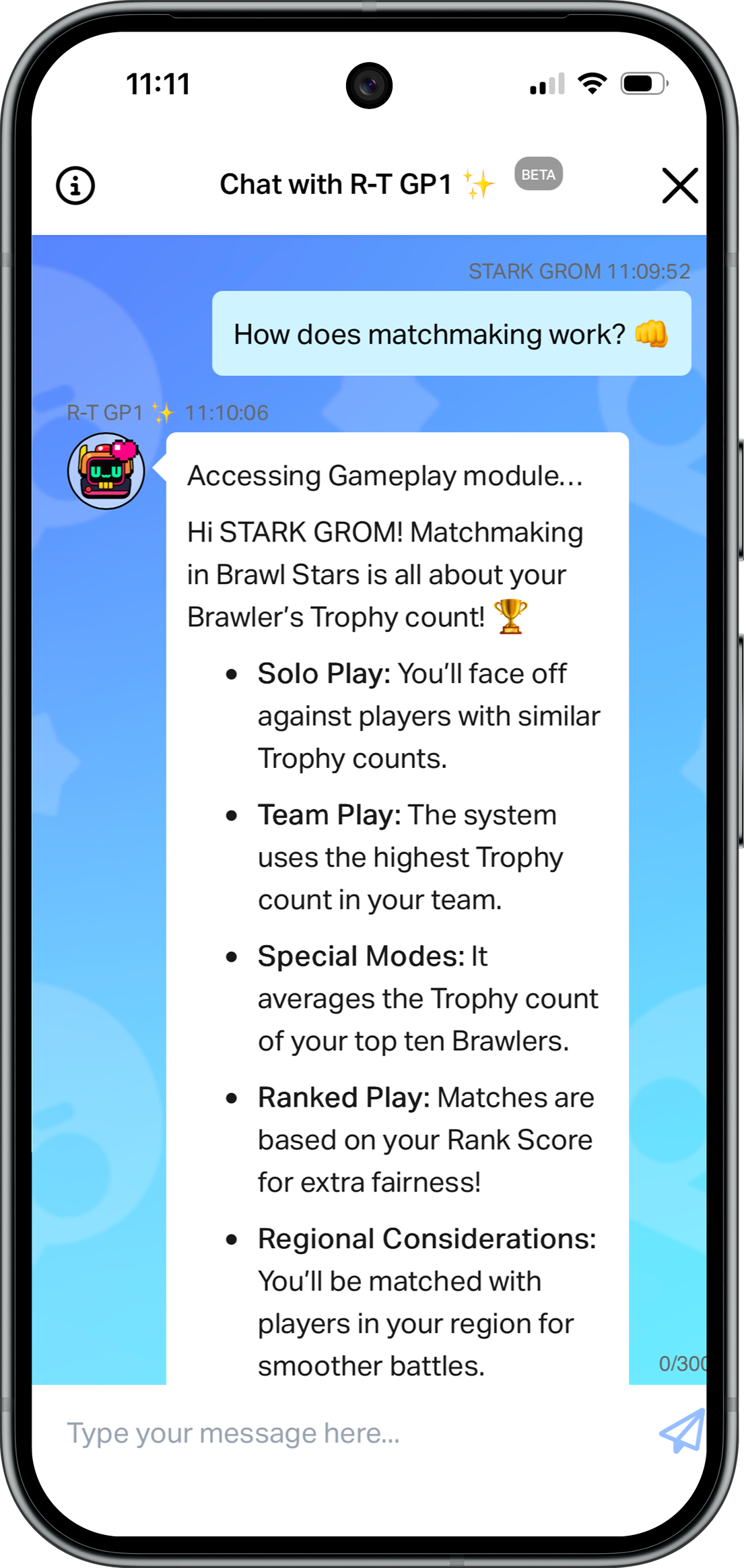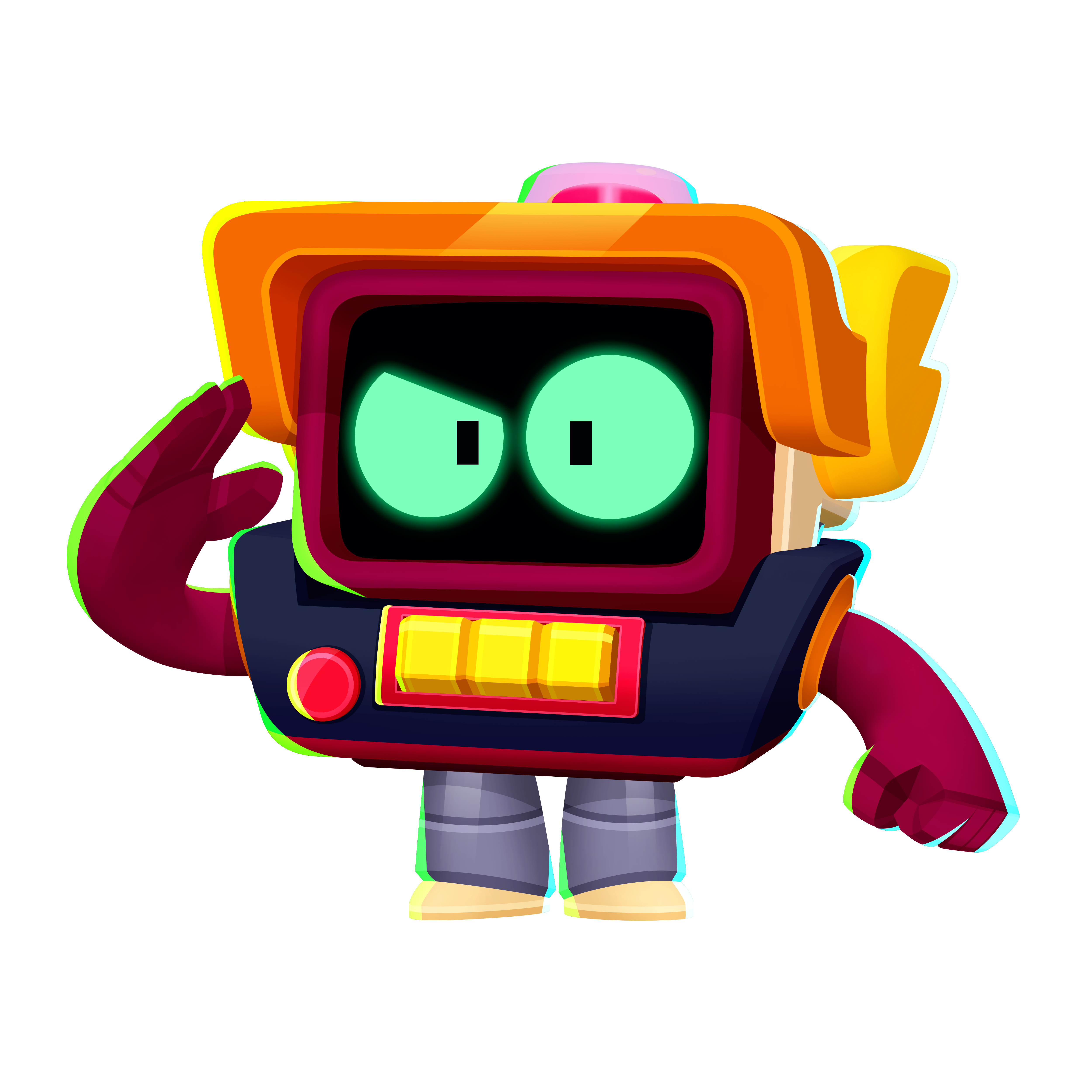How Supercell is Turning Player Support into Connected and Seamless Gameplay Experience with AI Agents
CSAT score increase
reduction in cost of resolving ticket
Avg response time (vs 1+ day)

- Supercell, maker of Brawl Stars, Clash of Clans, and other games played by millions worldwide, wanted a more seamless support experience, but as part of the gameplay and moving away from relying on busy human agents.
- In just 11 weeks, we built and deployed a multi-modal, virtual agent solution that classifies messages, flagging any particular risks or complex cases for the specialist human agents to handle, and generates a response tailored to a player's specific context.
- With an average 500m daily tokens on 4o and 200m daily tokens on 4o-mini across five games, Supercell have seen a 90% reduction in cost of solving a ticket, 20% higher CSAT scores and an average response time of 7 seconds.

BoomBoxx has been grinding hard to unlock a new brawler. But when Surge is unlocked, they hit a snag - he’s not in the roster. Puzzled, they hit the Brawl Stars menu, ‘help & support’, and fire off their question.
RT-GP1 provides an almost immediate response, understanding the player’s context and guiding them to a resolution - all within the gameplay experience. Instead of being stuck, BoomBoxx plays on, having never left.
For any b2c company, customer support is a priority. But not many take the approach of Supercell wanting to make support part of the overall seamless gameplay experience.
Supercell – maker of Clash of Clans, Brawl Stars, and a whole universe of games played by hundreds of millions across the world – had a different idea.
Could technology make support a part of the gameplay experience? What if it could be delivered by a character? Would that keep players engaged and coming back for more?
Supercell aims to make ‘games that are remembered forever’ and knows fast, accurate support is key to building player loyalty. It wanted to deliver a more seamless player experience and “level up performance” through tailored and immediate support, leveraging AI, and realised through a Virtual Agent solution.
Previously, Supercell’s player support model relied on a global team of almost 2,000 specialist human agents, using disparate data to answer customer questions, who were often busy with overwhelming demand and complex tasks.
It can take up to two years to train individuals to the right level to answer queries, and with expected organic churn of agents it was a costly operation to maintain this knowledge base. Given the global following of Supercell’s games, support teams are situated across the world to handle queries effectively, raising more scalability challenges.
Players would reach out for support on game features, completing certain tasks and other queries via a chat interface. While ChatGPT and other chat systems setting an expectation for a quick response, Supercell was unable to match this with human agents. As a result, players waited up to a day for a response and were less motivated to continue the game, becoming a flight risk to other games vying for their attention.
The challenge isn’t just capitalising on interest and responding fast, but producing a better experience and outcome for players.
Supercell partnered with Tomoro and OpenAI to deploy an agent-based approach as the antidote.
By embedding AI agents directly into its support ecosystem, Supercell wanted to increase the accuracy and quality of responses while maintaining a human feel to the player experience.
“We wanted to enhance how we support players and level up performance by leveraging the power of AI through a Virtual Agent solution, delighting players within the gameplay experience.”
Martin Mason, Head of Player Support, Supercell

In just 11 weeks, Tomoro engineers, in collaboration with OpenAI architects, built RT-GP1 within Brawl Stars: a production-grade, brand-aligned, multi-modal chatbot powered by GPT-4o. A multi-stage AI workflow blends classifiers, response generation, and persona control so a player receives a response that is relevant, safe, and aligned with the brand experience Supercell has carefully curated.
Behind the scenes, the system runs through its checks in seconds: is the message safe, what’s the intent, what knowledge is needed, does the response fit the brand tone, and should it escalate?
A single query flows through classifiers, retrieval, and persona control to ensure responses are consistent with Supercell’s tone. Players get answers that are fast, accurate, and feel like they came straight from the game itself.
Launched within Brawl Stars, RT-GP1 is engineered to:
- Ingest multimodal data in real-time, spanning gameplay logs, purchase history, and chat transcripts.
- Generate tailored responses instantly, tuned to the player’s specific context.
- Escalate complex issues to human teams, keeping agents focused on the cases that truly require judgment.
Crucially, the AI agents integrated seamlessly with existing workflows, minimising disruption while dramatically increasing coverage.
All this, from idea to prototype to production, in 11 weeks.
Now players like BoomBoxx and thousands of others are back in the game quicker. The average response time is 7 seconds - an enormous reduction from up to a day - and all within the gameplay experience and to the same level of accuracy.
Players are delighted. CSAT scores have jumped by 20% and RT-GP1 even generated its own organic hype on Reddit as the ChatGPT of Brawl Stars.
For Supercell and its highly trained human support team, the burden is reduced. The key resources who really understand the game can focus on producing better outcomes on the most complicated cases. Despite a 90% cost reduction in handling tickets, the game-maker’s aim never focused on reducing overheads but producing an improved gameplay experience.
“This is a huge step forward in delivering smarter, faster, and more scalable support to our players. Tomoro’s expertise combined with OpenAI’s technology allows us to resolve queries as if it was part of the game itself.”
Martin Mason, Head of Player Support, Supercell
Virtual agents are, crucially, able to flag high risk cases in messages they receive, flagging incidents of self-harm, terrorism and other dangerous factors, escalating these to human agents who can further respond.
And when support tickets peak along with interest in games - sometimes at 40,000 tickets a day - the virtual agents can handle the vast majority autonomously.
The launch of RT-GP1 has paved the way for more virtual agents – a further four gameplay agents have since been released in Clash of Clans, Clash Royale, Boom Beach and Squad Busters, with more on the runway to support players across all Supercell games.
For Supercell, support now matches the pace of play. By blending real-time data with brand-aligned AI characters, the game-maker has realised its vision of a more seamless player experience, setting a new benchmark for how to harness AI for deeper trust and engagement that other consumer brands will undoubtedly follow.
14th October 2025
Turn AI into your competitive advantage.
Contact UsSolve the hardest problems in AI.
Join Us